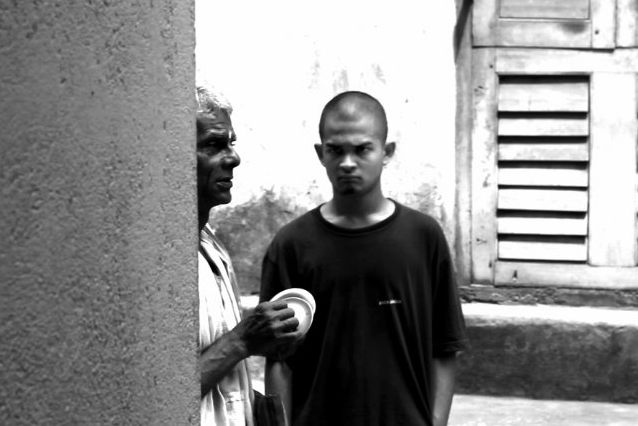« Starz Denver Film Festival 2011 - Once Upon a Time in Anatolia | Main | Starz Denver Film Festival 2011 - The Presence of Joseph Chaikin »
November 04, 2011
Starz Denver Film Festival 2011 - Gandu

Q - 2010
Overdose Joint
It might be sufficient to say that Gandu is unlike any other film from India. The filmmaker, Kaushik Mukherjee, who goes by name of Q, has been compared to Gaspar Noe, not inappropriate, considering some of the graphic content. Unsurprisingly, in a country that frowns upon on screen kissing, Gandu can not be seen in India. For those whose only exposure to Indian film is the high minded cinema of Satyajit Ray, or the song and dance and romance from Bollywood, Gandu will come as a shock.
There's more than kissing going on here, with scenes of fucking, sucking and dope smoking. The film is a combination of street documentary, music video, and hard core sex. What is also striking is to see the results of the globalization of culture, in the music, in the pornography, and even with a character who is obsessed with Bruce Lee. There are moments of informational overload, with multiple screens of talking heads and text running concurrently. Where Q also makes a significant cultural divergence from most Indian films seen in the west is that the action takes place in Kolkata, and the language is Bengali, rather than Hindi or Tamil.
Gandu is a film where the characters lives are a mess. What is not a mess is the cinematography, wide screen, mostly black and white. With a background in documentary filmmaking, Q's images are clean and clear, even if the subject matter is literally down in the dirt. What unfolds is a loosely told story about a young man, known as Gandu, the name is translated as asshole. Living in a spacious, if crumbling apartment with his mother, Gandu has only the vaguest sense of doing something with his live, blowing money on lottery tickets, and dreaming of becoming a music star. Most of Gandu's money seems to come from picking the wallet of his mother's lover. Days are spent hanging out with pal Ricksha, who gets by as a rickshaw driver. Gandu hates his life, yet spends more time wallowing in filth, looking for the easy way out, usually through drugs. On the surface, the description may seem hardly promising, yet the film remains entirely watchable because it shows sides of Indian life otherwise unknown.
Interviews with Q are helpful in putting Gandu in context, both regarding Indian cinema, and global independent filmmaking. For myself, I hope for the opportunity to see Q's previous film, the documentary Love in India. I don't think the intention of the film is to necessarily win friends and influence people as much as it is to provoke discussion on various topics, most obviously how sex is used by the characters in the film, and how it is presented by Q. I'm not even sure if the "normal" critical standards can apply to Gandu, not the least because it defies easy categorization. Within my own limited understanding of India and Indian cinema, I can recognize how Gandu may be deliberately offensive. At the same time, the provocation is not simply for its own sake, which makes all the difference.

(Viewed as DVD screener)
Posted by Peter Nellhaus at November 4, 2011 08:57 AM
